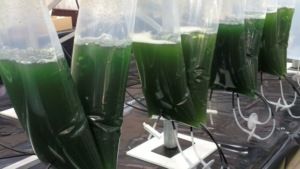News
Danish research: Microalgae could help produce medicine more efficiently
This article is more than 9 years old.
Process involves redirecting the energy produced by photosynthesis

The microalgae cultures grow rapidly using waste water and light (photo: Department of Plant and Environmental Sciences)
Researchers from the University of Copenhagen (KU) are investigating a new method of using microalgae to produce the complex molecules that make up the expensive parts of medication.
The researchers – from the Department of Plant and Environmental Sciences – are working on genetically modifying microalgae to better produce the costly molecules using sunlight.
“So basically, the idea is that we hijack a portion of the energy produced by the microalgae from their photosynthetic systems,” said Post-Doc Agnieszka Janina Zygadlo Nielsen, one of the researchers of the project.
“By redirecting that energy to a genetically modified part of the cell capable of producing various complex chemical materials, we induce the light driven biosynthesis of these compounds.”
READ MORE: Oxford University moves unique research project to Bornholm
Finding forskolin
The key to the method lays with the so-called P450 cytochromes, which are, roughly speaking, a type of enzyme that transports electrodes and are present in thousands of organisms including plants and trees which create valuable molecules as part of the metabolism.
The researchers have had success in introducing the enzymes and their biological pathways to the microalgae, which then can produce the molecules using the energy from their photosynthesis.
The researchers are hoping to be able to make difficult-to-produce medication, such as the important chemotherapy component Taxol, in a much more efficient manner than it is currently obtained – a laborious and expensive process involving tapping it slowly from yew trees.
So far, they’ve managed to produce dhurrin, a cyanogenic glycoside produced by plants, and while that isn’t overly useful in itself, they are now working on producing the commercially-viable compound forskolin, which is used for weight loss and blood pressure regulation.










































